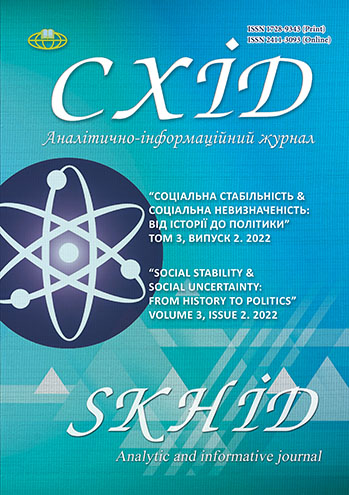Precariat as a result of personalizing modern social, labor and personal practices
DOI:
https://doi.org/10.21847/2411-3093.2022.3(2).287360Keywords:
precariousness, precariat, social and labor relations, neoliberal model, market flexibility, social anomieAbstract
The author analyzes the manifestations of social precariousness practices in modern social and labor relations. The analysis is carried out in three methodological directions: political (the formation of the precariat is determined by political factors); economic and technological (precarious practices are considered from the point of view of economic flexibility); functionalist (fixation of an individual’s psychological characteristics specific to precarious practices is carried out). It is proved that it is the functional approach that gives grounds for further considerations regarding the life strategies chosen by the precariats, as well as their attitude to the state as the main source of their problems. It was revealed that the combination of a high protest potential with a low ability to organize makes the precariat an environment where, against the background of a low material status, fear and uncertainty about one's future can generate extreme forms of reaction to them – from the conforming acceptance in an individual order of the labor relations’ formats, which are provoked by employers, to spontaneous mass protests, which, however, are not able to eliminate the causes of precariousness, but often turn into trashes, intensified by inter-racial and inter-confessional contradictions
Downloads
References
Alber, J., Heisig, J.P. (2011). Do New Labour Activation Policies Work? A Descriptive Analysis of the German Hartz Reforms, Discussion Paper SP I 2011–211. Berlin: Wissenschaftszentrum Berlin für Sozi-alforschung (WZB).
Aron, R. (1993). Demokratiya i totalitarizm [transl. from fr. G. Semenov]. Moscow, Tekst, 303 p. (In Russian)
Bauman, Z. (2005). Individualizirovannoye obshchestvo. Moscow.
Butler, J. (2009). Introduction: Precarious Life, Grievable Life. In: Frames of War: When Is Life Grievable? London: Verso.
Dreval, Yu. D. and Linetskyy, L. M. (2016). Prekaryzatsi-ya yak fenomen suchasnykh sotsialno-trudovykh vidnosyn. Visnyk Kharkivsʹkoho natsionalʹnoho tekhnichnoho universytetu silʹsʹkoho hospodarstva, 174: «Ekonomichni nauky», 34-43 (In Ukrainian).
EU – number of freelancers grows by 24% in 7 years (2016, June, 10). SIA (Staffing Industry Analists). https://www2.staffingindustry.com/eng/Editorial/Daily-News/EU-Number-of-freelancers-grows-by-24-in-7-years-38211
Haunss, Sebastian. (2016). Precarious Research in a Movement Society: Social Movement Studies in Germany. https://doi.org/10.2307/j.ctvgs0c35.18
Kalleberg, Arne. (2009). Precarious Work, Insecure Workers: Employment Relations in Transition. Amer-ican Sociological Review. 74, 1-22. https://doi.org/10.1177/000312240907400101 .
Labor force, total - United States (2020). World Bank, World Development Indicators data-base. https://data.worldbank.org/indicator/SL.TLF.TOTL.IN?locations=US
Litvinenko, O. (2009). Chto takoye prekariat. Neu Zeiten. http://neuezeiten.rusverlag.de/2009/07/24/chto-takoe-prekariat/ (In Russian)
Mansel, J. and Heitmeyer, W. (2010). Precarity, Segre-gation, and Poverty in the Social Space. Overview of the Research Status. http://www.difu.de/publikationen/ precarity-segregation-and-poverty-in-the-social-space.html
McKay, S. (2014). Precarious Work and Migration. Lon-don Metropolitan University https://impact.ref.ac.uk/-casestudies/CaseStudy.aspx?Id=42383
Pilling, D. (, 2014, September, 10). Japan is creating jobs but workers do not prosper Casualisation of the workforce is stifling the reflationary experiment. Fi-nancial Times. https://www.ft.com/content/ff22e590- 374a-11e4-8472-00144feabdc0
Savage, M. A (2013). New Model of Social Class? Find-ings from the BBC’s Great British Class Survey Ex-periment. Sociology. 2 (47), 219–250.
Standing, G. (2011). The Precariat : The New Dangerous Class. London and New York: Bloomsbury Academ-ic.
Winterman, Denise (2006, June, 8). The flip side of a McJob. BBC News Magazine. http://news.bbc.co.uk/1/hi/magazine/5052020.stm
Downloads
Published
How to Cite
Issue
Section
License
Copyright (c) 2023 Іван Олійник

This work is licensed under a Creative Commons Attribution-NonCommercial-NoDerivatives 4.0 International License.
1. Authors bear responsibility for the accuracy of facts, quotations, numbers and names used.
2. Manuscripts are not sent back.
3. The publisher does not always agree with the authors' opinion.
4. The authors reserve the right to authorship of the work and pass the first publication right of this work to the journal under the terms of a Creative Commons Attribution-NonCommercial-NoDerivatives 4.0 International License. This license allows others to distribute (copy) the published work for non-commercial purposes, provided there is mandatory attribution to its authors and a link to the first publication in our journal.
5. The authors have the right to conclude separate supplement agreements that relate to non-exclusive work distribution in the form in which it has been published by the journal (for example, to upload the work to the online storage of the journal or publish it as part of a monograph), provided that the reference to the first publication of the work in this journal is included.

